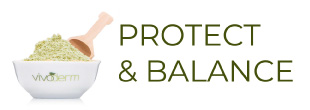SKIN HYDRATION: OILY VS. DRY
With oily skin, your face may often look shiny, and you naturally avoid products that feel oily. You’ll be more vulnerable to acne and breakouts than dry skin types. People with dry skin will notice that their skin feels dry and has a dull color and/or rough texture.
Oil Production
The skin has many oil (sebaceous) glands, which secrete oil that contains wax esters, triglycerides, and squalene. These fats (or lipids) form a film that helps keep moisture in the skin. While increased sebum production results in oily skin, the opposite is not always the case, as dry skin can also arise from an impaired skin barrier. Oil production can be affected by diet, stress, and hormones-as well as genetics. In a study of twenty pairs each of identical and nonidentical same-sex twins, identical twins had virtually identical amounts of oil production, while the nonidentical twins had significantly different amounts.
Dryness and oiliness depend primarily on the condition of the skin barrier, the outer layer of skin which helps the skin retain moisture, and the oil (sebum) production itself. The barrier is like a brick wall, with each brick (or cell) held in place by mortar (fats called lipids). Harmful ingredients, cold, and dry weather can wear down these fats, eroding the mortar so that the “bricks” are not secured in their proper place. A variety of outside agents, including detergents, acetone, chlorine and other chemicals, and even prolonged water immersion can harm the barrier, or the barrier may be deficient for genetic reasons.
The barrier’s main components are ceramides, fatty acids, and cholesterol, all different kinds of lipids. These must be present in the right proportion to keep the skin watertight. An impaired barrier will tend toward both dryness and sensitivity. Dryness results when skin moisture evaporates. Sensitivity results when a deficient barrier permits the entry of outside irritants.
Repairing the skin barrier with the right skin care products will help treat a variety of skin conditions. Incorporating key dietary nutrients, such as essential fatty acids and cholesterol, provides the necessary building blocks. Nutrient deficiencies can weaken your skin’s ability to repair and rebuild, which is why people who take cholesterol-lowering drugs often have dry skin.




